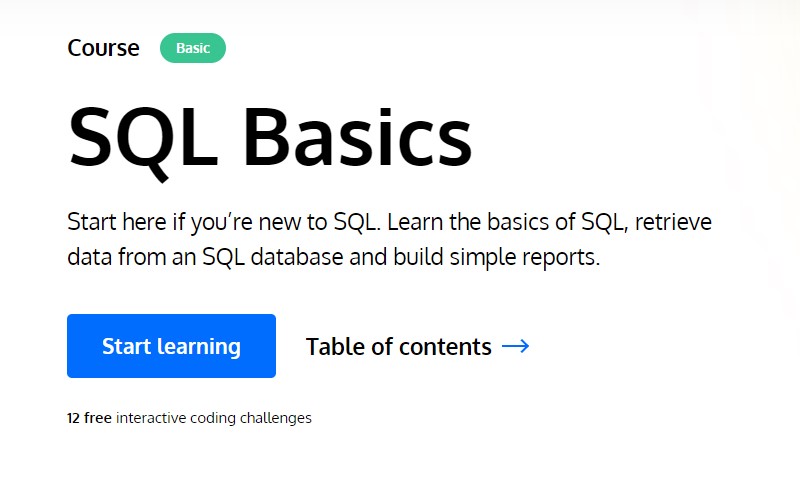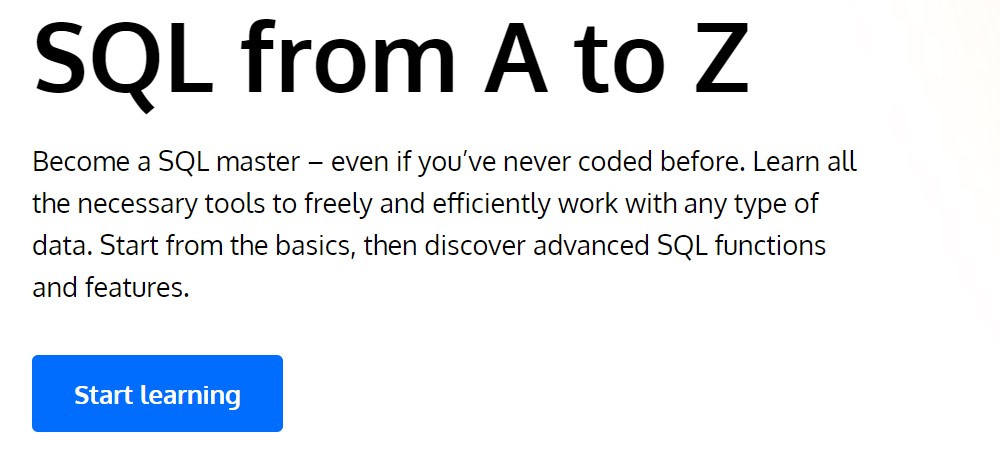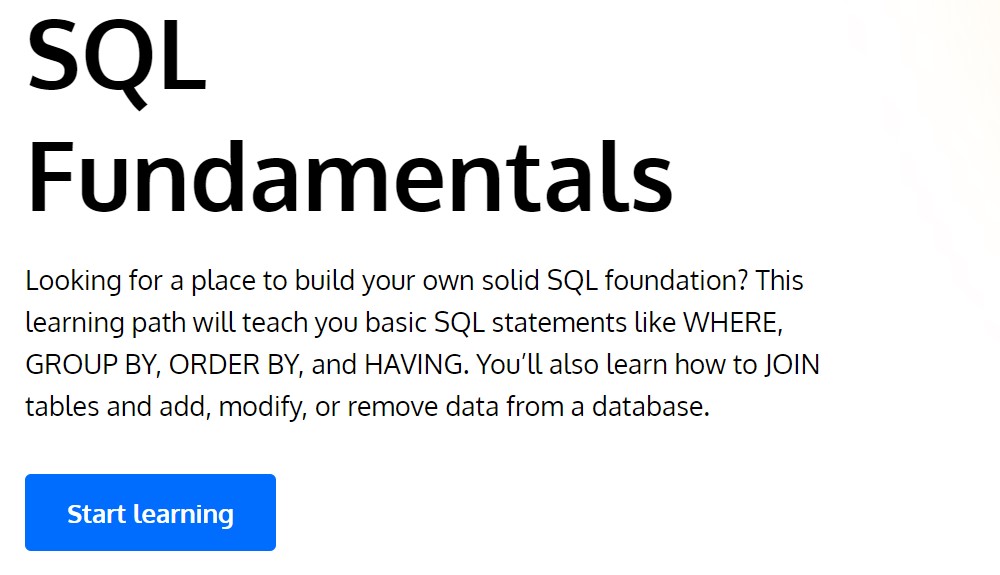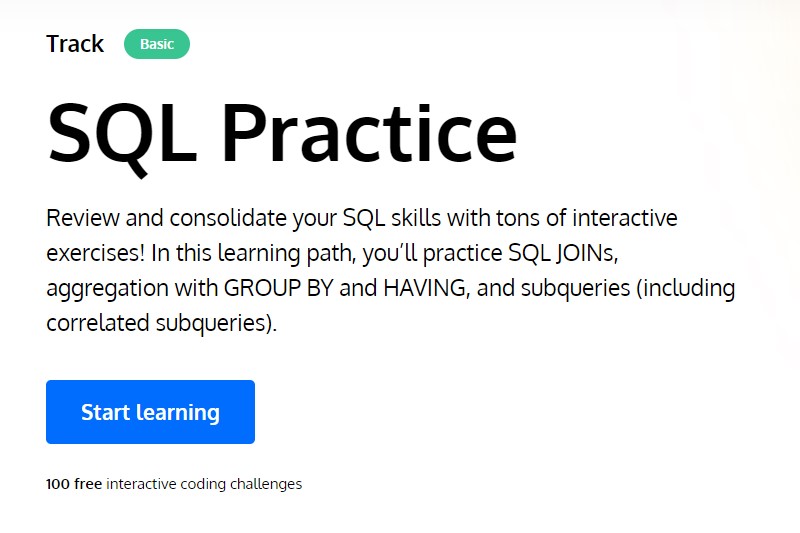Ready to dive into the world of SQL? Whether you're dreaming of a lucrative data career or just want a new skill under your belt, learning SQL is a smart move.
But with a sea of courses out there, how do you find the gems? I've got your back.
I've rolled up my sleeves and hand-picked the very best online SQL courses for beginners, so you can skip the duds and start your awesome data journey.
Here they are:
- SQL Basics
- SQL from A to Z
- Introduction to Structured Query Language (by University of Michigan)
- SQL Fundamentals
- SQL for Data Science (by UC Davis)
- SQL Practice
Why is SQL all the rage? It's the magic key that unlocks the secrets hidden in databases – those organized treasure troves of information. With SQL, you can ask questions (queries) of these databases, change them, and make them work for you.
This means uncovering valuable insights that can transform businesses and save serious cash. No wonder high-paying jobs like data analysts, data engineers, and software developers practically demand SQL skills.
Who Should Learn SQL?
If you're itching for a career change – within IT or beyond – SQL is your golden ticket. Working in marketing, finance, operations, or HR? Dealing with any kind of data? SQL is your new best friend. Seriously, anyone swimming in data will find SQL incredibly useful.
And let's face it, the digital age calls for digital learning. Online courses are the way to go, but the sheer number of options can be overwhelming. That's where this guide comes in. We're not just highlighting any courses – we're focused on the absolute best for beginners.
RDBMS: Your Data Home Base
Now, let's talk about Relational Database Management Systems (RDBMS). Think of them like super-organized warehouses for your data. They're structured like tables (rows and columns) and have relationships that connect different tables, making it a cinch to find and work with a ton of data.
Some of the major players in the RDBMS world include:
- Microsoft SQL Server: The heavy-duty option for big businesses handling tons of transactions and queries.
- MySQL: User-friendly and fast, a favorite for web development and smaller projects.
- PostgreSQL: Packed with advanced features for more complex data tasks.
Keep in mind, each database has its own SQL "flavor" (dialect). Don't sweat it if this sounds confusing – we've got you covered.
What Makes a Great SQL Course?
Before we reveal our top picks, let's talk about what makes a truly great SQL course:
- Content That Counts: The foundation is everything. A top-notch course covers all the essential SQL concepts you need to hit the ground running.
- Hands-On Practice: Learning SQL is all about getting your hands dirty. Look for courses with plenty of exercises and practice queries.
- Smooth Sailing: The easier, the better. We're talking clear explanations, engaging visuals, and a user-friendly practice environment. No roadblocks here.
- The Crowd Goes Wild: Check out those enrollment numbers and student ratings – they're a good indicator of quality.
- Bang for Your Buck: The best courses offer a killer combo of high-quality content at a fair price.
Ready? Here are the Top 6 Online Basic SQL Courses to Learn in 2024 and Beyond
#1. SQL Basics
The "SQL Basics" course is a great way to kick off your SQL journey. With 129 interactive exercises and 10 hours of learning, it covers all the core concepts you need. It's designed with beginners in mind, so no IT background is required.
One of the best things about this course is its accessibility – all you need is a browser and an internet connection. You can even try the first two lessons for free! With a whopping 280,000+ enrollments and a stellar rating, this is a popular and well-respected choice.
#2. SQL from A to Z
If you're looking for a comprehensive deep-dive into SQL, this is it.
This track covers everything from the fundamentals to advanced topics like window functions and recursive queries. It's designed for beginners but also has plenty to offer intermediate learners.
With 7 interactive courses, over 700 coding exercises, and an estimated 84 hours of learning, this track is a serious investment in your SQL skills.
#3. Introduction to Structured Query Language
Offered by: University of Michigan
This course guides you through four weekly modules, covering everything from table creation and SELECT statements to working with multiple tables.
While it does involve installing software and setting up a MySQL database, the content is comprehensive and well-presented by a respected professor.
If you're specifically interested in MySQL, this course is definitely a solid option.
#4. SQL Fundamentals
This track is perfect if you want a strong foundation without committing to the full "SQL from A to Z" journey. It focuses on the essential concepts and techniques you'll use most often in real-world scenarios.
With 3 interactive courses, over 300 coding exercises, and roughly 48 hours of learning, it's a more streamlined option that still delivers plenty of value.
#5. SQL for Data Science
Calling all aspiring data scientists! This course blends SQL basics with data analysis and science fundamentals.
Led by a seasoned data science instructor, it uses SQLite as its SQL dialect. You'll learn not just the basic commands, but also how to identify and retrieve relevant data subsets for analysis.
This course is worth it, believe me.
#6. SQL Practice
Already familiar with the basics?
This "SQL Practice" track is designed to help you solidify your skills and apply them to realistic scenarios. With 5 interactive courses, over 400 coding exercises, and around 57 hours of learning, it's like a boot camp for your SQL abilities.
Why wait? Enroll in this track now.
What's the Big Deal with SQL?
SQL's story started back in the '70s at IBM, and it was a game-changer. It was designed to make interacting with databases a breeze, using plain English to ask questions (queries) and get answers. This opened up a world of possibilities for relational databases, which are now essential to modern computing.
So, what's SQL used for today? It's the command center for databases, letting you manage and manipulate the data that businesses rely on daily. This means everything from customer info and sales tracking to running complex analyses that drive decisions. Developers use it to build the backbone of websites and apps, making sure data is accurate and accessible.
SQL is Everywhere
But it's not just techies who benefit. Marketing teams use SQL to understand customers, finance teams track transactions, and HR departments manage employee records.
The bottom line? Learning SQL opens doors across industries – it's a skill that translates to real-world value.
The World of Data Awaits!
I hope this guide helps you kickstart your SQL learning adventure. Remember, the "right" course is the one that aligns with your individual learning style and career aspirations. Take advantage of free trials, read reviews, and don't hesitate to ask questions.
And most importantly, put your newfound knowledge into action! The more you practice and apply SQL, the more confident and capable you'll become.
Good luck and happy querying!
The post 6 Can’t-Miss Basic SQL Courses to Learn in 2024: Your Fast Track to Data Mastery appeared first on RealSQLGuy.







